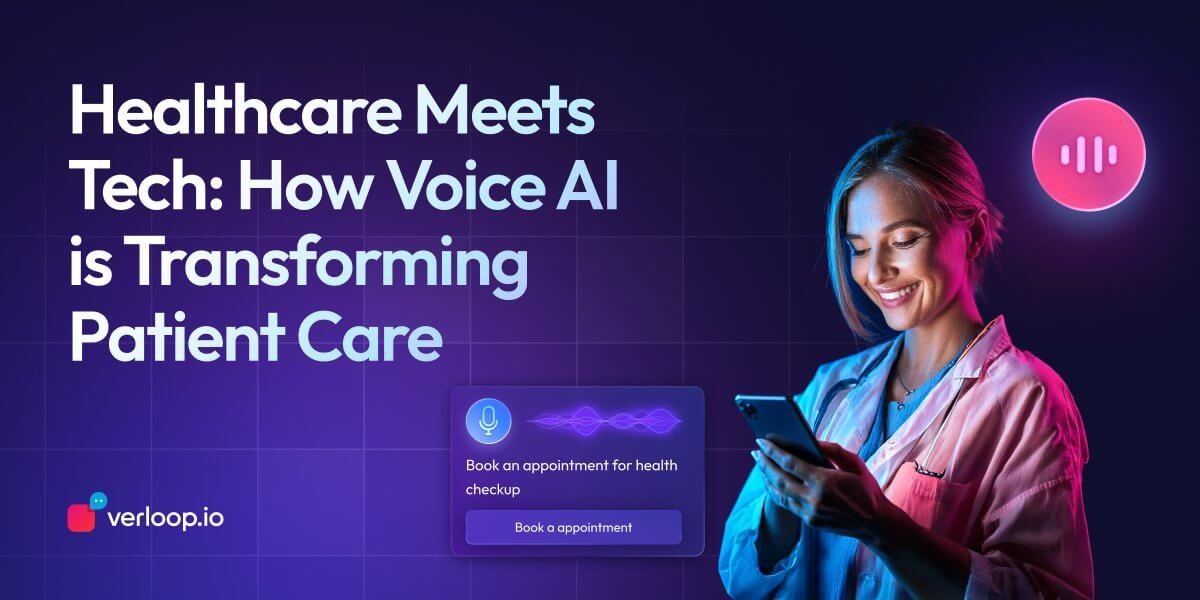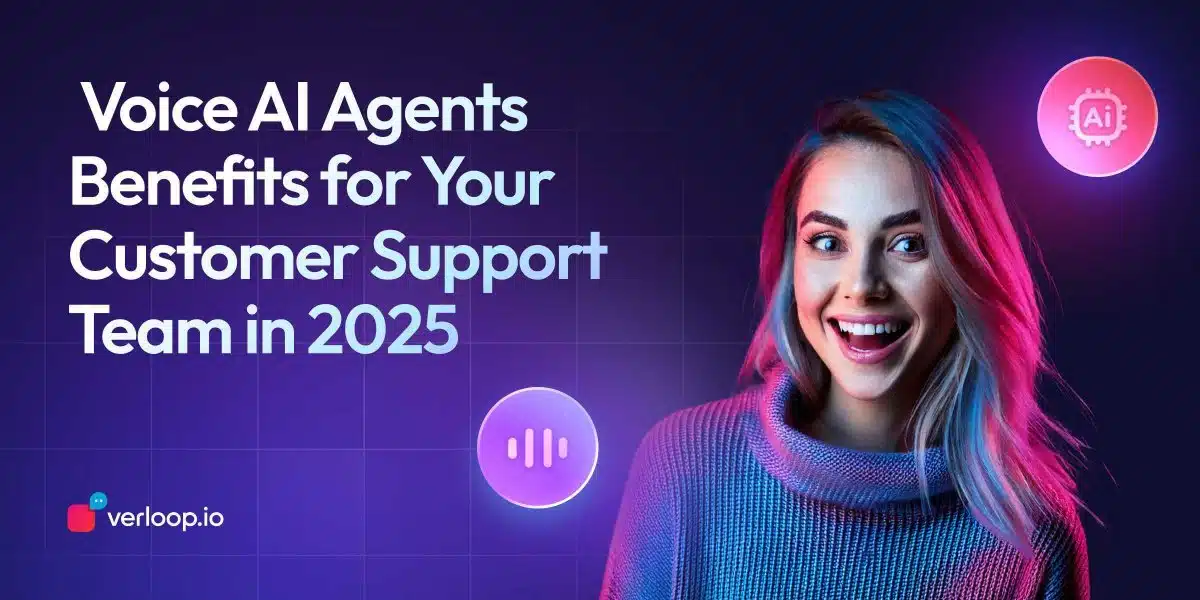Healthcare Meets Tech: How Voice AI is Transforming Patient Care
- February 9th, 2025 / 5 Mins read
-
 Aarti Nair
Aarti Nair

Healthcare Meets Tech: How Voice AI is Transforming Patient Care
- February 9th, 2025 / 5 Mins read
-
 Aarti Nair
Aarti Nair
Voice AI in healthcare refers to the use of voice-enabled tools powered by AI to ease patient management and the workflow of healthcare. It combines speech recognition, natural language processing, and neural networks to create a human-like conversational experience.
Hospitals and healthcare providers are already leveraging these advancements to develop AI-powered voice virtual assistants that can answer patients, automate clinical documentation, offer virtual consultations, send medication reminders, and even monitor chronic conditions.
This not only frees up valuable time for medical professionals but also empowers patients to take a more proactive role in managing their health from anywhere. The latest study indicates that the use of Voice AI calls solution in the healthcare industry improves productivity by 40% and customer satisfaction level by 60%.
So, let’s dive into the world of Voice AI in healthcare! Explore its benefits and challenges to solutions and real-world examples.
Current State of the Voice AI Platform Industry in Healthcare
Let’s kick things off by having a chat about where we stand today. The voice AI improving healthcare industries patient engagement isn’t just whispering in the corridors—it’s speaking loud and clear. Recent stats indicate that the global voice recognition market in healthcare is growing at a CAGR of around 18%, with over 65% of consumers preferring personalised interactions through voice-enabled systems. You might have noticed a surge in demand for solutions like a Voice AI Calls platform, whether you’re in India or the UAE, and this trend is only set to continue.
The Landscape in Numbers and Practice
When we take a closer look, it’s clear that voice ai calls in healthcare are reshaping how we manage patient interactions and streamline administrative tasks. For example:
Personalisation
According to recent research, 65% of healthcare consumers feel that a more conversational approach—like that offered by advanced Voice assistant call software—makes them more comfortable and engaged.
Efficiency
Data shows that healthcare providers using voice AI experience up to a 30% reduction in manual processing times, effectively allowing you and me to focus on what truly matters: patient care.
Geographical Reach
Emerging markets such as India and the UAE are witnessing a rapid uptake in voice AI calls in india and voice AI calls in the UAE respectively, with local providers reporting improved patient satisfaction scores and operational efficiency.
Think of it this way: just as we wouldn’t settle for a one-note ringtone, we also shouldn’t settle for outdated call systems. Instead, we’re tuning in to solutions that truly understand and respond to our needs—making every interaction count.
With robust statistics backing this trend, it’s evident that whether you’re exploring a Voice AI Calls platform or considering specialised solutions like voice ai calls in healthcare, the time to adopt voice AI is now. Up next, let’s dive into how Verloop.io’s state-of-the-art technology, powered by large language models, can be your next game-changer.
What are the current applications of voice AI calls in healthcare?
The voice AI inbound and outbound, has a wide range of applications in healthcare. Let’s discuss some of them here.
1. Patient engagement and education
Healthcare organisations are using voice AI outbound assistants to provide instructions, guidelines, and navigation for patients.
A very good example is WebMD, where they have incorporated Alexa to offer detailed healthcare information and lifestyle information.
For instance, the patient can ask:
“Hey Alexa, tell me the symptoms, cause, and treatment of disease X.”
The identical formula can be applied across any healthcare system to streamline inquiries regarding appointments.
Likewise, Voice AI is used to provide important support to ensure that patients follow medical routines. It reminds them of medication time and dosage or notifies them of refills.
2. Mental health support
Mental health is a global health crisis today. And Voice AI has been an evolution in the field to help the patient and its mitigation.
How, you ask?
Psychologists say that mental health issues can be identified by listening to how a person says certain things and not just what a person says.
According to Dr Espionala, “Their speech is generally monotone, flatter, and softer. They also have a reduced pitch range and lower volume. They take more pause. They stop more often.” Whereas patients with anxiety “tend to speak faster. They have more difficulty breathing.”
Based on that, AI-based sound technology analyses voice patterns and detects subtle changes in a person’s speech. Such as tone, speed, pitch, and other vocal features, indicating underlying mental health conditions. Hence, it opens possibilities for early detection and diagnosis.
The AI then guides the patient with medication and stress release exercises and helps users manage their stress level or provides relevant and reliable resources.
3. Administrative tasks and workflow
Healthcare professionals often spend a significant amount of time on administrative tasks. This includes documentation and retrieving patient data from the EHR system.
Therefore, the application of voice AI has proven effective in mitigating this time drain. Text-to-speech software is employed to automatically capture conversations between doctors and patients and record them in EHRs.
This process can be expanded to include prescription management and routine transactions, such as updating patient records or obtaining personalised reports, resulting in a more streamlined workflow.
Check out how Verloop.io helped Even Health here:
Benefits of Voice AI Solution in Healthcare
1. Improve patient outcomes
Voice AI plays a vital role in improving patient outcomes by extracting vocal biomarkers from a patient’s voice to identify and clarify various illnesses like respiratory diseases and mental health conditions.
For instance, Cardio utilises speech samples from mobile devices to detect fluid buildup in the lungs. A crucial indicator of early-stage congestive heart failure (CHF).
Hence, this enables early intervention, potentially saving lives. Moreover, seamlessly integrating Voice AI into clinical workflows and electronic health records (EHRs) enhances the overall efficiency of healthcare processes.
By analysing patient data, the AI not only aids in identifying specific diseases like depression or asthma early, but also recommends personalised care plans, contributing to more effective and tailored treatment.
2. Enhance patient experience
Voice assistants can gather patients’ details like age, current medications, symptoms, and medical history to create personalised health profiles. These profiles can be used to assess the urgency of their needs and suggest appropriate specialists for consultation or follow-up, improving patient experience.
Additionally, when patients have questions, the assistants can provide reliable and regularly updated health information in real-time. With Verloop.io’s help, healthcare providers and institutes can offer 24/7 support, enabling patients to seek assistance at any hour. Hence urgent cases can be prioritised efficiently.
3. Increase efficiency and cost saving
Healthcare professionals can verbally record their observations, findings, and decisions about patients’ conditions, maintaining a formal medical record. This method is quicker than manually typing detailed notes. It allows them to capture details while fresh in mind–enhancing accuracy.
According to the NIH, 77% of those utilising voice AI reported increased efficiency.
Meanwhile, voice AI automates tasks like data entry, report generation, and scheduling meetings, freeing up employees’ time for more strategic work. This automation reduces the need for dedicated personnel in these roles while providing 24/7 assistance, thus lowering labour costs.
4. Accessibility and inclusivity
For high-risk patients facing complex post-discharge care, voice AI can offer accessible remote monitoring through regular check-ins, alleviating anxiety, and improving satisfaction.
Additionally, its ability to translate languages can seamlessly bridge communication gaps. Which fosters better understanding and care experiences for patients and providers alike.
Challenges and Consideration
Despite the benefits of voice AI in healthcare, there still are several challenges like ethical and practical biases, privacy concerns, limited functionality and more. Let’s discuss them in detail and see how we can tackle them.
1. Data privacy and security
Training and improving voice AI algorithms often rely on large datasets containing patient data. This data can include both personally identifiable information (PII) and protected health information (PHI).
Hence raises significant concerns about data privacy and security. The use of such sensitive information carries inherent risks, including cyberattacks and identity theft.
Therefore, to maintain data privacy and security make sure:
- You access risk and perform due diligence while choosing AI vendors. Check the company’s track record, security practices, and how they handle patients’ data.
- Your organisation has special agreements with the vendors that use or disclose PHI for safety.
- you comply with privacy regulations such as the Health Insurance Portability and Accountability Act (HIPAA) to prevent the risk of data breach or misuse.
- Have strong security measures in place, such as multi-factor authentications and biometric verification.
2. Ethical implications and bias
Patients likely have concerns about consent, transparency, and autonomy. As they lack an understanding of the implications of using their voice data in AI applications.
Similarly, the inherent complexity of medical procedures and technologies often leaves patients feeling apprehensive. that’s because they may not fully grasp the specifics, potential benefits, and associated risks involved.
At the same time, voice AI trained on a limited dataset may struggle to comprehend diverse accents, tones, and language nuances. That can potentially lead to misinterpretations and hinder effective communication with patients.
So, here are some solutions to it.
- Prioritise transparent communication with patients about the purpose, benefits, and potential risks associated with using voice AI in healthcare.
- Collect a broad range of voice samples from various demographics, languages, and accents to create a more inclusive dataset
- Conduct rigorous testing during the early stage of development. Focus on interactions with diverse patient groups.
- Engage healthcare professionals and linguistics experts to regularly review the AI’s responses.
- Involve patients in the decision-making process and seek their input to ensure that voice AI tools align with their preferences and values.
- Limited functionality and accuracy
Current voice AI cannot handle urgent situations. It mainly handles basic tasks like appointment scheduling, medication reminders, and symptom checking. It isn’t yet equipped for deeper tasks like diagnosis or treatment plans.
At the same time, medical jargon and nuances still pose a challenge. If the AI is trained in a specific accent or dialect, it might struggle with others. Hence leading to inaccuracies.
So to improve that, continuous advancement in NLP, medical integration and responsible development are essential. It will ensure that voice AI serves as a reliable and equitable tool for improving healthcare delivery.
Also, partnerships between researchers, developers, healthcare professionals, policymakers and patient advocacy groups are essential to ensure continuous and responsible advancement of voice AI in healthcare.
How Verloop.io Voice AI Technology Can Help
Now that we’re on the same wavelength about the industry’s progress, let’s explore how Verloop.io’s voice AI technology can help you navigate this evolving landscape. By leveraging cutting-edge large language models (LLMs), we’re not just following trends—we’re setting them. Imagine a system that’s as fluent and adaptive as a well-trained conversationalist; that’s what our technology brings to the table.
Bridging Technology and Real-World Application
Our approach is simple: we believe in talking the talk and walking the walk. Here’s how our voice AI solution can transform your operations:
Natural, Contextual Conversations
Our LLM-powered platform interprets queries with the finesse of a seasoned professional, ensuring that every interaction feels like a natural conversation. This isn’t just about automation; it’s about understanding context and nuances, much like a friendly chat over a cuppa.
Enhanced Efficiency
With real-time responses that cut down on wait times and administrative overheads by as much as 30%, you’re free to focus on what matters most—improving patient care. This is especially crucial for users of voice assistant call software who require precision and speed.
Global Versatility
Whether you’re deploying a Voice AI Calls platform in India, exploring voice AI calls in the UAE for a localised experience, or implementing voice AI calls in healthcare across multiple regions, our technology adapts seamlessly to varied regulatory and linguistic contexts.
Personalised Engagement
Imagine receiving a call where the system not only recognises your query but also tailors its response based on previous interactions. That’s the promise of our LLM models—a promise of personalisation that drives better outcomes and more satisfied users.
To wrap up, Verloop.io’s voice AI technology isn’t just about keeping pace with industry trends—it’s about setting new benchmarks. By harnessing the power of advanced LLM models, our solution transforms every interaction into an engaging, efficient, and intuitive experience. Whether you’re interested in a robust Voice AI Calls platform, need specialised features for voice AI calls in healthcare, or are exploring market-specific solutions like voice AI calls India and voice AI calls UAE, we’re here to ensure you always have the right words at the right time.
Future of Voice AI Call Platform
The future of voice AI in healthcare appears promising. We are most likely to see the revolution of NLP applications, LLM and AI-powered doctors with virtual assistants becoming an integral part of healthcare delivery.
As NLP in healthcare evolves, it is expected to play a pivotal role in improving predictive analytics, personalised medicine, and decision support for healthcare professionals.
Also, the ability of NLP to quickly identify trends, extract key insights, and manage unstructured data positions it as a crucial component in enhancing patient care. So there will be more streamlined workflows. That will contribute to the overall optimization of healthcare systems.
Not only that, as investments in digital health technologies continue to rise, the collaboration between AI-powered doctors and virtual assistants holds promise in revolutionising the healthcare industry.
With the ability to bridge geographical barriers, optimise resource utilisation, and prioritise patient needs, it will offer improved patient outcomes, increased efficiency, and greater overall satisfaction.
Now, you can witness how advanced NLP and ML capabilities can revolutionise your healthcare practices with Verloop. Stay ahead, stay informed, and elevate your healthcare journey. Experience the transformative power of Verloop firsthand by requesting for a demo.






